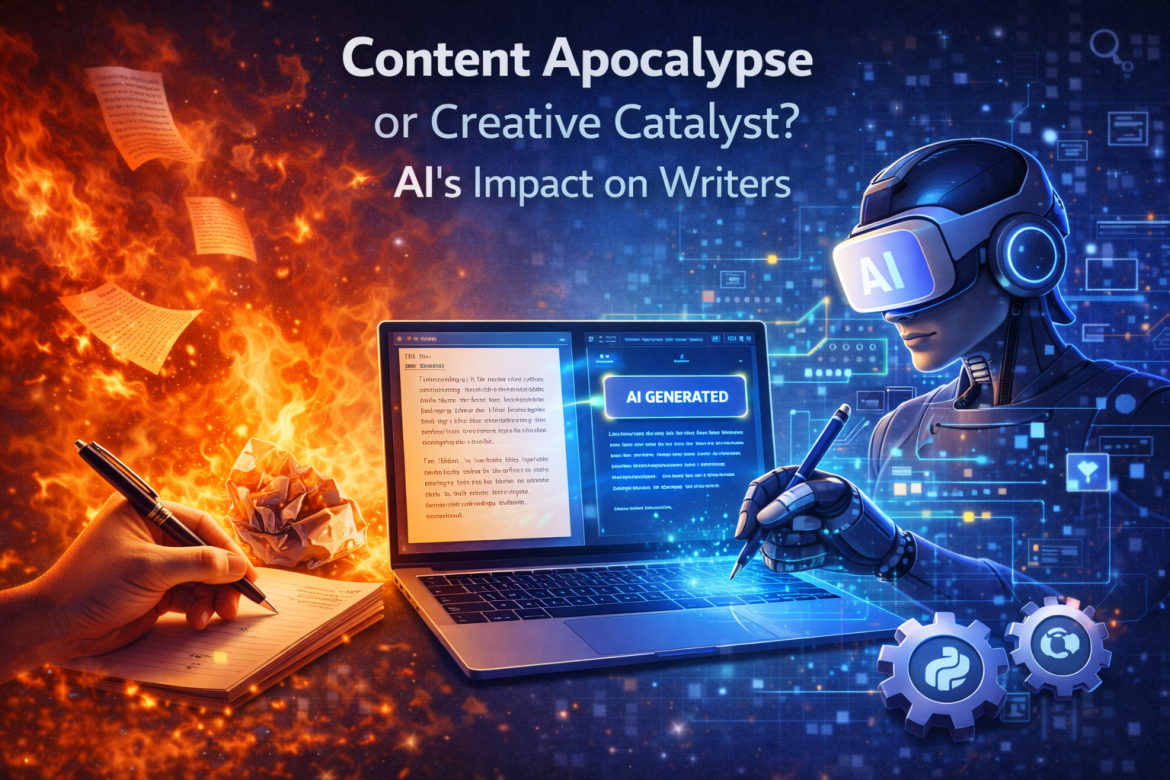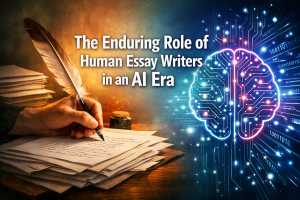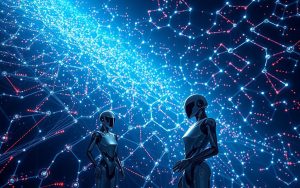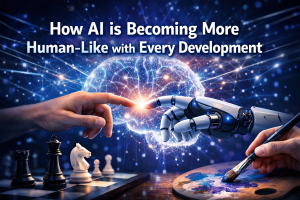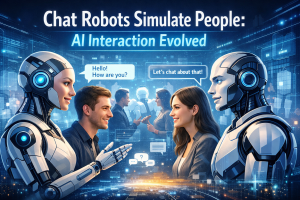Table of Contents
AI’s Impact on Writers: Content Apocalypse or Creative Catalyst?
The rise of Artificial Intelligence (AI) has sent tremors through the creative world, with content creators feeling a particular unease. Headlines scream about the “robot takeover” of writing, leaving human wordsmiths scrambling for new careers. But is this fear justified? Will AI truly spell the end for human writers? As we navigate 2026, understanding AI’s impact on writers is more critical than ever.
Here, we delve into the complex relationship between AI and content creation, exploring both the potential pitfalls and exciting possibilities that lie ahead for writers.
Key Takeaways on AI’s Impact on Writers
- 🤖 AI as a Tool, Not a Replacement: AI excels at efficiency and data-driven content generation, but struggles with true creativity, emotional depth, and unique human voice.
- ✍️ Redefined Roles: Writers in 2026 will increasingly become editors, strategists, and prompt engineers, leveraging AI for mundane tasks to focus on high-value creative work.
- 🔍 The Rise of Human Oversight: A human editor is crucial for fact-checking, bias correction, and injecting nuance into AI-generated content, especially with tools like AI detectors becoming commonplace.
- ⚖️ Ethical Imperatives: Transparency about AI usage and robust human oversight are essential to maintain trust and address potential biases in content.
- 📈 New Opportunities: Adapting to AI means developing new skills in AI tool utilization, focusing on unique human capabilities, and building strong personal brands to thrive in the evolving content landscape.
The Rise of the AI Scribes: Efficiency at Scale
There’s no denying that AI has made significant strides in content generation. AI-powered tools can now churn out a wide variety of content, from basic blog posts to complex news articles, product descriptions, and even social media captions. These tools analyze vast amounts of data to mimic human writing styles, grammar, and even humor to a certain degree. While the quality can sometimes be uneven, the technology is constantly evolving, leading to increasingly sophisticated outputs.
This rapid advancement has understandably caused concern. Some envision a future where AI replaces human writers altogether, mass-producing content that is formulaic, derivative, and devoid of the nuance and creativity that human expression brings. This perspective fuels the “Content Apocalypse” narrative, a fear that human authorship will become obsolete in 2026.
“The true measure of AI’s success in writing won’t be its ability to mimic human language, but its capacity to amplify human ingenuity.”
Can Machines Capture the Human Touch? The Limits of AI Writing
While AI excels at generating factual content and replicating established styles, it still struggles with the very essence of human writing: originality, emotional depth, and the ability to connect with readers on a personal level. This is where AI’s impact on writers becomes a question of differentiation, not eradication.
Originality and the Spark of Creativity
Witty humor, clever metaphors, and the ability to weave a captivating narrative – these are all hallmarks of human creativity that AI currently struggles to replicate. A well-crafted story can make you laugh, cry, or ponder life’s big questions. Can a machine truly evoke these emotions in the same way a human writer can? AI can analyze existing patterns and trends, but it can’t truly come up with entirely new ideas or experiences from scratch. Its creativity is, at its core, a sophisticated form of pattern recognition and recombination.
Consider the unexpected plot twist, the profound philosophical insight, or the deeply personal anecdote that resonates universally. These elements stem from human experience, intuition, and a unique perspective that AI, lacking consciousness, cannot possess. While AI might generate text that *appears* creative, it’s often a pastiche of existing creative works, lacking the genuine spark of innovation.
Emotional Depth and Reader Connection
One of the most powerful aspects of human writing is its ability to tap into our emotions. A skilled writer can make us laugh, cry, or feel empathy for a character. AI, on the other hand, often struggles to understand and convey complex emotions. While it can mimic certain emotional tones by analyzing sentiment in existing data, it lacks the depth and nuance of human experience. It doesn’t *feel* joy or sorrow, and thus its portrayal of these emotions, while technically accurate, can feel hollow or inauthentic to a discerning reader.
Building a genuine connection with an audience relies on more than just conveying information; it requires understanding shared human experiences, vulnerabilities, and aspirations. This intrinsic ability to connect on a deeply human level remains a significant barrier for AI.
The Power of Voice and Personal Connection
Every writer develops a unique voice over time, shaped by their experiences, personality, and perspective. This unique voice is what allows writers to connect with readers and build a loyal following. Think of your favorite author – their distinct style, humor, or empathetic tone is what draws you in. AI can analyze writing styles and attempt to mimic them, but it can’t develop its own voice because it lacks a personal identity or consciousness.
This personal brand, this inimitable voice, is what makes human writers irreplaceable for content that seeks to build communities, inspire trust, or express genuine thought leadership. In 2026, content that truly stands out will likely be characterized by its authentic human voice.
The AI Advantage: A Writer’s Best Friend? Redefining the Role
Instead of viewing AI as a competitor, perhaps a more productive perspective is to see it as a powerful tool. Imagine AI assistants that take care of the tedious tasks that often bog down the writing process: keyword research, data analysis, and generating basic outlines or first drafts. These tools can free up writers to focus on the aspects of the craft, like the creative spark, the emotional connection, and the unique voice of a skilled writer. This shift in perspective defines the positive side of AI’s impact on writers, positioning it as a creative catalyst.
The future of content creation might not be a battle between humans and machines but rather a collaborative effort. AI can handle the heavy lifting of research, data analysis, and even content generation in certain scenarios. This can allow writers to focus on the aspects that truly set them apart: creativity, emotional intelligence, and the ability to tell stories that resonate with the human experience.
| Task Type | AI Strengths (2026) | Human Writer Strengths (2026) |
|---|---|---|
| Research & Data Analysis | Rapid processing of vast datasets, trend identification, summarizing complex information. | Critical evaluation of sources, identifying nuances, ethical considerations, cross-disciplinary synthesis. |
| Content Generation (First Drafts) | Generating outlines, basic articles, product descriptions, social media posts, boilerplate text. | Crafting compelling narratives, injecting unique voice, developing complex arguments, nuanced humor. |
| Editing & Refinement | Grammar, spelling, syntax correction, style consistency, readability checks. | Fact-checking, bias detection, emotional resonance, thematic consistency, creative enhancement. |
| Idea Generation | Brainstorming based on patterns, suggesting topics, keyword expansion. | True originality, conceptual innovation, personal insights, connecting disparate ideas. |
The Rise of the Human Editor: Fact-Checking the AI Revolution
One crucial point to remember is that AI-generated content can sometimes be flawed. While many AI tools boast impressive accuracy, having a human editor review the output is always wise. This editor can ensure factual accuracy, identify potential biases in the AI’s writing, and inject the human touch that elevates content from good to great. In 2026, the role of a meticulous human editor is arguably more important than ever.
Furthermore, the rise of AI might even lead to a demand for a new skill set: the ability to identify AI-generated content. Tools like a free AI detector are on the rise, letting anyone see if something’s written by a person or a machine. This creates a new skill: figuring out AI-written stuff. Folks who get good at using these free checkers might land new jobs as our world gets filled with both human and AI-made content. This creates a fascinating new dynamic in the publishing world, where trust and authenticity become premium commodities.
Featured Tool: GPTZero – AI Detector
GPTZero is a leading free AI detection tool designed to help users identify whether text was generated by an AI model or written by a human. It’s becoming an essential instrument for editors, educators, and publishers in 2026 to maintain content integrity and transparency.
- Purpose: Identifies AI patterns in text.
- Availability: Free, web-based tool.
- Utility for Writers: Helps editors verify content authenticity and ensures transparency for readers.
The Ethical Considerations: Transparency and Human Oversight
One major concern is transparency. If readers consume AI-generated content without being aware of it, it raises questions about authenticity and trust. Imagine reading a news article that was actually written by a machine or a social media post that seems like a personal reflection but was crafted by an algorithm. This lack of transparency can erode trust in media and information sources, which is a significant aspect of AI’s impact on writers and their audience.
To address this, there needs to be a push for transparency in content creation. Platforms and publishers should clearly disclose whether their content is human-written or AI-generated. This allows readers to make informed decisions about the information they consume. Standardized labeling, similar to nutritional information on food, could become commonplace for digital content in 2026.
Another ethical consideration is human oversight. While AI can be a powerful tool, it shouldn’t be left to operate entirely independently. Human oversight is crucial to ensure that AI-generated content is accurate, unbiased, and ethical. Humans need to be involved in setting parameters for AI writing tools, monitoring their outputs, and ensuring they are used responsibly. This includes scrutinizing AI for inherent biases in its training data, which could lead to skewed or discriminatory content if unchecked.
The Evolving Landscape: New Skills and Opportunities
The rise of AI presents challenges and exciting opportunities for writers. Far from facing a content apocalypse, writers have the chance to evolve and thrive. Here are some ways writers can adapt and thrive in the changing landscape of 2026:
Developing Expertise in AI Tools
Writers who can effectively leverage AI tools will have a significant advantage. Learning how to use AI for research, content generation, and editing can streamline the writing process and free up time for more creative endeavors. This isn’t just about pressing a button; it’s about mastering prompt engineering – the art of giving AI the right instructions to get the desired output. Understanding how different AI models operate and their specific strengths and weaknesses will be a highly sought-after skill.
Focus on High-Value Skills: The Core of AI’s Impact on Writers
While AI can handle basic writing tasks, it can’t replace the need for human creativity, critical thinking, problem-solving skills, and empathy. Writers who hone these skills and focus on creating high-value content, such as in-depth analysis, investigative journalism, creative storytelling, persuasive argumentation, or deeply personal narratives, will remain in high demand. These are the areas where human insight and originality truly shine.
- Step 1: Master Prompt Engineering: Learn how to craft clear, specific, and effective prompts for AI tools to guide their output precisely. This turns you into an AI conductor.
- Step 2: Cultivate Critical Thinking: Develop an eagle eye for factual inaccuracies, logical fallacies, and potential biases in AI-generated text. Your judgment is paramount.
- Step 3: Enhance Emotional Intelligence: Focus on writing that evokes genuine emotion, builds rapport, and connects with readers on a human level. AI struggles here.
- Step 4: Specialize in Niche Expertise: Become an authority in a specific field. AI can gather data, but human experts interpret it with nuanced understanding and foresight.
- Step 5: Embrace Strategic Content Planning: Move beyond mere writing to strategic content development, understanding audience needs, market trends, and business objectives.
Building a Strong Personal Brand
In an increasingly crowded content landscape, it’s more important than ever for writers to develop a strong personal brand. This brand should showcase your unique voice, expertise, and value proposition. By building a loyal following, writers can ensure their work stands out from the machine-generated noise. Authenticity and a distinct human perspective will be key differentiators for writers in 2026.
The Human Touch Will Always Matter: A Look to the Future
The future of content creation will likely be a blend of human and AI capabilities. AI will continue to evolve, offering ever more sophisticated tools for writers. However, the human touch will always be essential. The ability to think critically, tell compelling stories, and connect with readers on an emotional level – these are all uniquely human skills that AI cannot replicate.
As AI continues to transform the content landscape, writers who embrace change, develop new skillsets, and leverage the power of AI tools will thrive. The future of writing is not about humans versus machines but about humans and machines working together to create content that is both informative and engaging.
In conclusion, AI presents a significant shift in the content creation landscape, but it’s not the end for human writers. It’s an opportunity to redefine the role of the writer, focusing on creativity, emotional intelligence, and the unique voice that only humans can possess. By embracing AI as a tool and honing the skills that set them apart, writers can ensure their place in the ever-evolving world of content creation in 2026. The true “Creative Catalyst” is the human writer empowered by AI.
References
- OpenAI. (2023). *ChatGPT: Optimizing language models for dialogue*. (Note: Specific publication details may vary depending on the model version or related research papers).
- Ambrose, G., & Harris, P. (2018). *The Fundamentals of Creative Writing*. Bloomsbury Publishing.
- Kaplan, A., & Haenlein, M. (2019). Siri, Siri, in my hand: Who’s the fairest in the land? On the interpretations, illustrations, and implications of artificial intelligence. *Business Horizons, 62*(1), 15-25.
- Lee, K. F. (2018). *AI Superpowers: China, Silicon Valley, and the New World Order*. Houghton Mifflin Harcourt.
Frequently Asked Questions about AI’s Impact on Writers
Will AI take over all writing jobs by 2026? 🤖
No, it’s highly unlikely that AI will take over all writing jobs by 2026. While AI can automate many routine and data-driven writing tasks, it still lacks the unique human abilities of true creativity, emotional intelligence, critical thinking, and developing a distinctive voice. Human writers will shift their focus to higher-value content, editing AI outputs, and strategic content planning.
How can writers use AI tools effectively? 🛠️
Writers can use AI tools effectively by leveraging them for tasks like keyword research, generating initial outlines, brainstorming ideas, summarizing long texts, and drafting basic content. The key is to see AI as an assistant to boost productivity and free up time for creative and strategic work, rather than a full replacement for human input. Mastering prompt engineering is also crucial.
What kind of content is best suited for human writers in the AI era? 🌟
Content that requires deep human insight, emotional connection, original thought, nuanced persuasion, and a unique personal voice is best suited for human writers. This includes investigative journalism, compelling storytelling, thought leadership articles, creative fiction, poetry, complex opinion pieces, and content that builds strong personal brands and communities.


